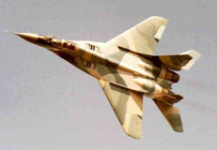Russia’s weapon sales to Sudan assailed
By MARK MacKINNON, The Globe and Mail
MOSCOW, Aug 12, 2004 — The Russian government is under fire from aid groups for its policy of continuing to sell advanced weapons to Sudan even as international condemnation of the mass murder of civilians in Darfur grows.
 Russia, one of the countries blamed for watering down the wording of last month’s United Nations resolution on the conflict by insisting that the word “sanctions” be removed, has been delivering MiG fighter planes to Sudan throughout the bloodshed in Darfur. The latest delivery of two jets came in late July, just days before the weakened UN resolution was passed by the Security Council, and amid concern that the planes could be used against civilians.
Russia, one of the countries blamed for watering down the wording of last month’s United Nations resolution on the conflict by insisting that the word “sanctions” be removed, has been delivering MiG fighter planes to Sudan throughout the bloodshed in Darfur. The latest delivery of two jets came in late July, just days before the weakened UN resolution was passed by the Security Council, and amid concern that the planes could be used against civilians.
“We think the MiG planes being sold by Russia are likely to be used to commit human-rights violations in Darfur,” said Benedicte Goderiaux, an Amnesty International researcher on Sudan. “The way Russia has been dealing with this is very problematic. . . . They just don’t care.”
Pavel Felengauer, an independent defence analyst based in Moscow, said Russia has never tied arms sales to buyers’ human-rights records, and suggested that the 12 MiGs may be just the tip of the iceberg. He said the Sudanese government recently notified the Kremlin that it has $3-billion (U.S.) to spend on military hardware.
“There will be a lot more weapons going [to Sudan]. That’s why Russia is resisting the sanctions: It would complicate matters,” he said.
Mr. Felengauer said a recent visit to Minsk by Sudanese President Omar Hassan al-Bashir is likely aimed at laying the groundwork for more weapons deals in the former Soviet Union; Belarus is a major player in the international arms trade.
“Often, if Russia says it can’t, Minsk says it can. Russia often sells through Minsk,” Mr. Felengauer said.
The last two jets received by Sudan were delivered five months ahead of schedule, and amid continuing talk of a possible international military campaign to force the Khartoum-backed janjaweed militia to end its bloody rampage in Darfur, which has left an estimated 30,000 people dead and one million homeless.
Many consider the slaughter a genocide perpetrated by the Arab militia against the region’s black African population, with the support and knowledge of the Sudanese government.
At a recent press conference in Moscow, Sudanese ambassador Chol Deng Alak said the 12 fighters his country purchased from Russia under a 2001 deal will ensure that Sudan isn’t “an easy target” for its enemies.
Ten of the jets were MiG-29SE fighters; two were MiG-29UB combat trainers.
Russian weaponry may already be playing a direct role in Darfur. Both Amnesty International and the New York-based Human Rights Watch have interviewed civilians who claim to have seen MiGs and Russian-made Antonov planes attacking refugee camps.
The Sudanese government says such reports are inventions by rebel groups trying to win international sympathy, and many defence experts agree, arguing that MiGs are designed for air-to-air combat and would be of limited use against ground targets. MiG general-director Valery Toryanin has been quoted in the Russian press as saying the delivery was hurried only to let Sudan show off the jets at coming celebrations marking the 50th anniversary of its armed forces.
The recent acceleration of Russia-Sudan links goes beyond the military sphere. On July 29, the day before the UN resolution was passed, the Russian company Stroitransgaz won a contract to build a 366-kilometre pipeline in the Melut basin in southeast Sudan, a region abandoned four years ago by the Canadian junior oil company Fosters Resources Ltd. because of pressure from human-rights groups.
